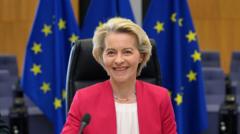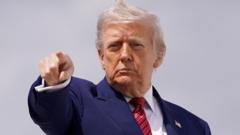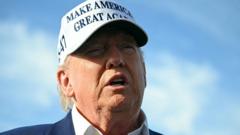The European Commission's President, Ursula von der Leyen, has expressed readiness to expedite trade negotiations with the United States but requests until July 9 to finalize a beneficial deal, following escalating tensions over tariffs.
EU Seeks Extension for Trade Deal with US Negotiations

EU Seeks Extension for Trade Deal with US Negotiations
Ursula von der Leyen outlines the EU's need for more time in discussions with the United States to ensure a favorable trade agreement.
The President of the European Commission, Ursula von der Leyen, has communicated a desire to advance trade talks with the United States swiftly, but she indicated that the European Union requires until July 9 to achieve a satisfactory agreement. Following a "good call" with U.S. President Donald Trump, she aims to overcome recent frustrations expressed by Trump regarding the pace of negotiations. The U.S. leader had threatened to implement 50% tariffs on EU goods, fueled by dissatisfaction over trade discussions.
In the wake of Trump's announcement of a 20% tariff on numerous EU imports last month—later reduced to 10% until early July—von der Leyen insisted that patience and time would facilitate a "good deal." Trump reiterated his willingness to escalate tariffs during a press conference, indicating urgency in the trade talks to enhance economic relations.
EU Trade Chief Maroš Šefčovič stood firm on the EU's commitment to achieving a fair agreement, emphasizing the importance of mutual respect over threats of tariffs. He acknowledged the substantial trade dynamic between the EU and the U.S., which remains one of the largest global trading partnerships. Last year, the EU's exports to the U.S. surpassed $600 billion, while imports were valued at $370 billion.
The ongoing negotiations are complicated further by longstanding issues surrounding tariffs on automobiles and agricultural products, alongside existing levies like the 25% on EU steel and aluminum. As tensions heighten, European leaders, including those from France and Germany, have called for diplomatic resolutions, warning that escalating tariffs could incur detrimental consequences for both economies. In a strategic move, the EU has paused plans for its own 25% tariff on a range of U.S. goods, but further discussions may lead to new countermeasures against U.S. imports valued significantly more.



















